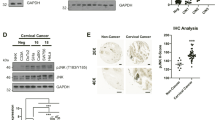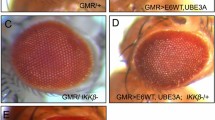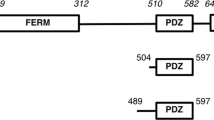Abstract
The inappropriate activation of protein-tyrosine kinases (PTKs) has been associated with initiation and progression of several types of human cancers. We therefore postulated that immortalization by DNA tumor viruses results in the induction of PTKs fundamental to these processes. An RT – PCR-based screen was thus used to identify PTKs that were abundantly expressed in HPV-18-immortalized epithelial cells and HPV-containing carcinoma cell lines. One of the genes isolated in this screen was the focal adhesion kinase (FAK; pp125FAK), a cytoplasmic protein kinase that is activated in v-src transformed cells or by stimulation with mitogenic polypeptides. FAK also becomes catalytically active upon integrin engagement with extracellular matrix proteins, such as fibronectin. We found that FAK expression and activity were significantly elevated in HPV-18 E6/E7-immortalized human genital epithelial cells relative to their primary cell counterparts. Protein expression and tyrosine phosphorylation of the putative FAK substrate, paxillin, were also notably increased upon HPV-18 immortalization of genital epithelial cells and in HPV-containing cervical carcinoma cell lines. Most significantly, these cells expressed markedly higher levels of both intracellular and extracellular fibronectin, thus providing a mechanism for activation of FAK and increased tyrosine phosphorylation of paxillin. These findings suggest a role for the integrin/FAK-mediated signaling pathway in cervical carcinogenesis and represent one of the first demonstrations of a tyrosine kinase whose activity is elevated following viral immortalization.
This is a preview of subscription content, access via your institution
Access options
Subscribe to this journal
Receive 50 print issues and online access
$259.00 per year
only $5.18 per issue
Buy this article
- Purchase on Springer Link
- Instant access to full article PDF
Prices may be subject to local taxes which are calculated during checkout
Similar content being viewed by others
Author information
Authors and Affiliations
Rights and permissions
About this article
Cite this article
McCormack, S., Brazinski, S., Jr, J. et al. Activation of the focal adhesion kinase signal transduction pathway in cervical carcinoma cell lines and human genital epithelial cells immortalized with human papillomavirus type 18. Oncogene 15, 265–274 (1997). https://doi.org/10.1038/sj.onc.1201186
Received:
Revised:
Accepted:
Issue Date:
DOI: https://doi.org/10.1038/sj.onc.1201186
Keywords
This article is cited by
-
Focal Adhesion Kinase (FAK) Overexpression and Phosphorylation in Oral Squamous Cell Carcinoma and their Clinicopathological Significance
Pathology & Oncology Research (2020)
-
Pharmacological profiling of a dual FAK/IGF-1R kinase inhibitor TAE226 in cellular and in vivo tumor models
BMC Research Notes (2019)
-
Activation of Src, Fyn and Yes non-receptor tyrosine kinases in keratinocytes expressing human papillomavirus (HPV) type 16 E7 oncoprotein
Virology Journal (2013)
-
Abnormal expression of paxillin correlates with tumor progression and poor survival in patients with gastric cancer
Journal of Translational Medicine (2013)
-
Malignant transformation of 293 cells induced by ectopic expression of human Nanog
Molecular and Cellular Biochemistry (2011)



